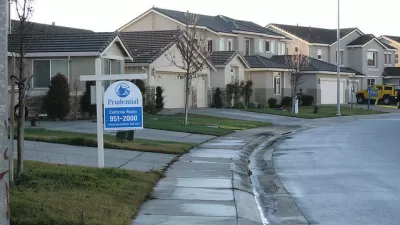A growing number of homeowners associations around the country are using old legal tools to keep institutional investors from buying up, and renting out, the neighborhood.

An article by Peter Whoriskey and Kevin Schaul for The Washington Post tells the story of a group of Charlotte residents that fought back against pressure from institutional investors looking to corner the real estate market in their neighborhood.
Charlotte is one of the prime examples of the trend of large Wall Street investors buying up housing stock, especially in distressed neighborhoods, communities of color, and neighborhoods with a large amount of rental housing units.
"Last year, investors bought nearly 1 in 7 homes sold in the nation’s top metropolitan areas — the most in two decades of record-keeping, according to a Washington Post analysis of data from realty company Redfin," according to the article. In Charlotte, those numbers are more like one in four. The only city where investors are buying a larger share of the number of housing for sale is Atlanta, according to the Post analysis.
In a move that has been repeated by a growing number of neighborhood and homeowners associations around the country, according to the article, the Potters Glen Homeowners Association in Charlotte created a new rule that requires any new home buyer in the neighborhood to wait two years before renting their new home out. "Since the board adopted the rule in 2019, property records show the pace of investor purchases has dropped by more than half," according to the article.
For the record, some institutional investors are pushing back on tactics like the Potters Glen rule in terms that echo the opposition to exclusionary zoning practices.
Invitation Homes, one of several big firms that own houses in Potters Glen, called the rental restrictions "prejudicial, discriminatory, uninformed, and misaligned with the concept of fair housing." The company said it was "disheartened by the trend of HOAs [homeowners associations] determining that renters are not welcome in their neighborhoods."
For another example of resistance to the growing footprint of Wall Street in the real estate market, see the example of the Port of Greater Cincinnati Development Authority, which in January 2022 beat out a long list of investors for the purchase of 195 houses in Cincinnati and surrounding Hamilton County.
FULL STORY: Corporate landlords are gobbling up U.S. suburbs. These homeowners are fighting back.

Planetizen Federal Action Tracker
A weekly monitor of how Trump’s orders and actions are impacting planners and planning in America.

Congressman Proposes Bill to Rename DC Metro “Trump Train”
The Make Autorail Great Again Act would withhold federal funding to the system until the Washington Metropolitan Area Transit Authority (WMATA), rebrands as the Washington Metropolitan Authority for Greater Access (WMAGA).

DARTSpace Platform Streamlines Dallas TOD Application Process
The Dallas transit agency hopes a shorter permitting timeline will boost transit-oriented development around rail stations.

Renters Now Outnumber Homeowners in Over 200 US Suburbs
High housing costs in city centers and the new-found flexibility offered by remote work are pushing more renters to suburban areas.

The Tiny, Adorable $7,000 Car Turning Japan Onto EVs
The single seat Mibot charges from a regular plug as quickly as an iPad, and is about half the price of an average EV.

Supreme Court Ruling in Pipeline Case Guts Federal Environmental Law
The decision limits the scope of a federal law that mandates extensive environmental impact reviews of energy, infrastructure, and transportation projects.
Urban Design for Planners 1: Software Tools
This six-course series explores essential urban design concepts using open source software and equips planners with the tools they need to participate fully in the urban design process.
Planning for Universal Design
Learn the tools for implementing Universal Design in planning regulations.
Municipality of Princeton
Roanoke Valley-Alleghany Regional Commission
City of Mt Shasta
City of Camden Redevelopment Agency
City of Astoria
Transportation Research & Education Center (TREC) at Portland State University
US High Speed Rail Association
City of Camden Redevelopment Agency
Municipality of Princeton (NJ)





























